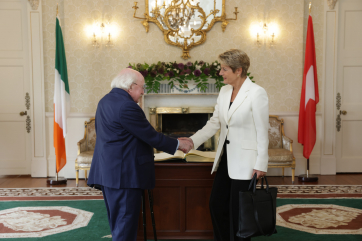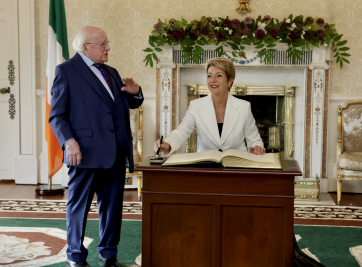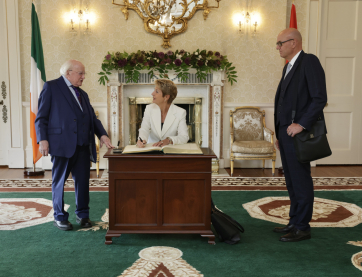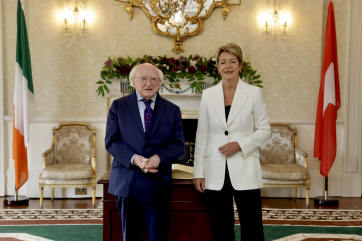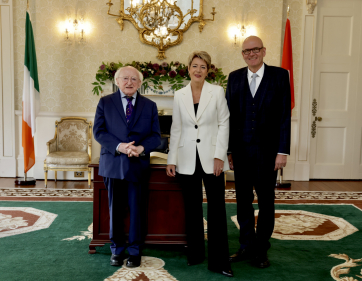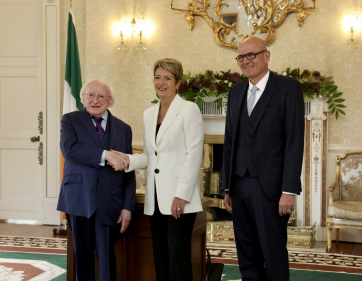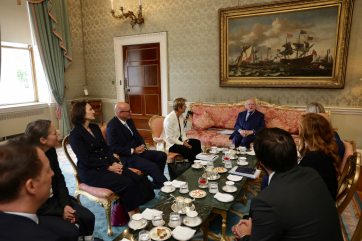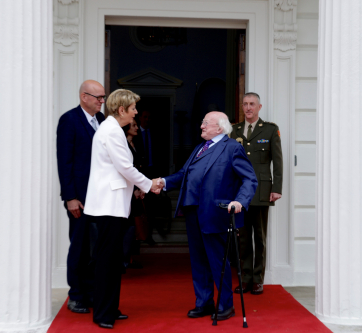Speech at the Opening of Bloom 2025
Phoenix Park, Thursday, 29 May 2025
A cháirde,
Tá áthas orm a bheith anseo inniu i dtimpeallacht álainn Pháirc an Fhionnuisce agus muid ag seoladh Bloom 2025. Mo bhuíochas le Jim O’Toole, Príomhfheidhmeannach Bhord Bia, as cuireadh a thabhairt dom a bheith i bhfeighil ar oscailt na hócáide seo.
May I say how delighted I am to return once more to Bloom. May I begin by offering my thanks to Jim O’Toole, Chief Executive of Bord Bia, for his kind invitation to once again serve as Patron of this remarkable festival, and to formally launch Bloom 2025.
This year, we celebrate the 19th edition of Bloom. Spanning over 70 acres here in the Phoenix Park, over the past nearly two decades the event has blossomed into Ireland’s leading festival of plants, garden design, horticulture, food and drink for all its patrons and loyal supporters.
Bloom has come to represent the unofficial launch of Summer here in Ireland, so embedded has it become into our social calendar, and it has built a loyal core of supporters that Sabina and I have come to know very well over the last 14 years.
Bloom is, year upon year, an uplifting and inspiring celebration of the role of nature and the importance of biodiversity in our lives, a vibrant event that reflects our nation’s challenge of recovering, deepening and celebrating its relationship with nature, with food, with sustainability, and with one another on our shared, precious planet.
Last year the festival welcomed over 100,000 visitors, a clear reflection of the public’s passion for the outdoors, and what it offers and how it belongs to us all, horticulture and food, and a figure that I am sure will be equalled if not surpassed over the coming days.
Sustainability and preserving the natural world are themes that have consistently been central to Bloom. I am delighted to see that these are once again among the most valuable threads that weave throughout the festival programme, which this year includes key attractions such as:
21 magnificent show gardens that pay tribute to Mother Nature;
11 pop-up postcard gardens, supported by Tirlán CountryLife, which are built in one day by community groups;
The Food Village, featuring over 100 artisan food and drink producers, all of whom are members of Bord Bia’s pioneering Origin Green sustainability programme, the only national programme of its kind in the world; and
The Sustainable Living Stage, and the Conservation Area, showcasing a range of ideas that utilise principles of sustainable ecology.
Bloom’s ongoing success is undoubtedly a reflection too of our welcome, albeit late, collective acknowledgment across society that we live on a fragile planet, one that is facing catastrophic climate change and ecological breakdown.
We are living, as we all know, in an era of profound environmental challenges, one that is defined by shared interacting crises. The world’s leading climate scientists have told us, with increasing urgency, that the planet we share is in peril. Biodiversity loss and the accelerating and devastating consequences of a warming world are no longer projections, they are now our lived experience.
The clear signs of human-induced climate change reached new heights in 2024, which was likely the first calendar year in which global average temperatures were recorded as being more than 1.5°C above the pre-industrial era.
The impacts of climate change in Ireland are impacts with which we are all familiar. They are reflected by not only the threat but the experience of the consequences of rising sea levels, and also of course by an increased frequency and severity of weather events such as high-impact storms, droughts and floods.
Too many of us will have experienced the dreadful consequences of Storm Éowyn at the end of January. May I take this opportunity to thank again all those who worked to address the severe consequences, including all of the first-responders, for their valiant efforts.
We have to make ourselves aware of the imbalance between those who are carrying the consequences of a warming Earth and those who contributed to where we find ourselves in terms of the climate change which has been provoked.
Recent research, published this month in Nature Climate Change, reveals the disproportionate role that wealth and inequalities that are immoral in their scale and abuse play in this crisis. The top 10 percent of the world’s wealthiest individuals have been responsible for two-thirds of the global warming observed since 1990. The wealthiest 1 percent alone contributed 26 times more than the global average to the increase in extreme heatwaves and droughts.
All of this is occurring in a world where we are witnessing the increasingly devastating effects of runaway biodiversity loss. All forms of life on our planet are affected. Recent research from Queen’s University Belfast indicated that almost half of Earth’s species are “now in decline”, and that the planet appears to be entering its sixth mass extinction period brought about entirely by humans.
In recent times, I have found it necessary to go so far as to refer to all of this as a singular ‘species failure’ – that is, the species that claims rationality and reflection in its actions is leaving a legacy of consequences for other life forms on the planet, demonstrating an inability to live harmoniously with the wide diversity of life on our planet.
These are stark truths that we must acknowledge if we are to have any hope of achieving environmental and economic justice both for now and for future generations.
Amidst these challenges, let us not overlook the reasons for hope nor the transformative potential of alternative futures.
Reflecting on the themes that have been central to my Presidency, I remain convinced that there are alternative ways of living together on this fragile planet — ones shaped not by the narrow pursuit of self-interest, but by the pursuit of the shared opportunities, joys and resonance that are available with each other and with nature.
This vision demands a new model of living together, of universalism, one that recognises the limits of ecology, and invites us to create more sustainable, flourishing, equal lives together, on our shared precious planet, one that seeks to find a means of establishing symmetry between economics, ecology and ethics.
All of this is possible by us working, in our different ways, together for a shared purpose.
During my 14 years as Uachtarán na hÉireann, I have had the privilege of witnessing a groundswell of grassroots initiatives – community-led, citizen-driven, often voluntary – that have sought to restore harmony between human activity and the natural world, initiatives that speak to the very best of our shared values.
The recent formalisation of the role and value of community gardens was a most welcome development. Community gardens speak to our most humane instincts, to nurture, to cooperate for the common good, and to live in a respectful relationship with nature and with one another. I greatly hope that this recent formalisation marks a turning point, a seed planted that, with care and commitment, can flourish into a landscape where such vital initiatives are supported and celebrated as they deserve to be.
This year, we also mark the tenth anniversary of the establishment of the United Nations Sustainable Development Goals, our shared global blueprint for a more inclusive, fair, and sustainable world. It is encouraging to note the progress Ireland has made. Recent assessments show that over 80 percent of the 169 SDG targets have been achieved here, with particularly significant strides in education, health and wellbeing.
Serious challenges remain across all sectors however if we are to reach our 2030 EU and domestic greenhouse gas emissions reduction targets as outlined in the latest projections from the Environmental Protection Agency (EPA) published yesterday.
There are now very few who do not accept what is the irrefutable evidence of science and our contemporary experience.
Research from the Environmental Protection Agency highlights that over 80 percent of our citizens express concern about climate change, and three in four recognise that extreme weather poses a tangible risk to their communities in the coming decade. This widespread public awareness, borne of information as well as of lived experience, shows that the public support is there for actions on these critical issues.
However, many who are locked into a carbon-intensive lifestyle feel hopeless. Some do not feel that they have the financial resources to make the necessary changes and need help to make a difference, others feel daunted by the disruption, and many, while anxious, are waiting for calls to action from others. All must find a way, however, for their needed actions.
Sometimes when we hear about the devastation on our planet, we may think that this is too big a problem for us individuals to solve. However, it is all of the small and practical actions that we can all take, together, that are both necessary and are actively contributing to the solution.
I would like to say some words on the role that we – as garden-lovers and nature-lovers – can play in tackling climate change. Those close to nature know better than most the challenges that we already face.
For example, the way we lay out our planting and gardens, appropriate landscape management can, through a suitable selection of plants and trees, contribute to supporting wildlife and enhancing biodiversity in our immediate surroundings.
Opting for natural surfaces as opposed to hard landscaping can allow soakage and minimise run off in the event of heavy rain, thereby reducing the risk of erosion and flooding.
Native hedgerows and wildlife-friendly gardening that focuses on native flowers can play a hugely important role in biodiversity and in the mitigation of climate change.
May I continue to urge gardeners and horticulturalists to consider using alternative fertilisers, including organic forms of fertiliser, to limit the negative effects on our climate and natural environment.
May I say how delighted I am this year to witness the Feature Garden entitled “Nature’s Symphony: Celebrating Organic Growth” designed by Oliver and Liat Schurmann. Traosláim leo. This imaginative and inspiring space highlights Ireland’s deepening commitment to organic agriculture, reflecting a vision of food production that is ethical, sustainable, and attuned to the rhythms of nature.
I am deeply honoured that the garden includes a reference to my own longstanding support for organic food production, sustainability, and the arts. The presence of Con Mór, the gentle eco-conscious giant from the West of Ireland, is a particular delight. Con Mór, a protector of birds, lover of trees, symbol of ancestral wisdom, reminds us of the myths and stories that connect us to our landscapes, and that continue to inspire new generations of guardians of the Earth.
May I also take a moment to add my voice in support of those commercial producers who have stayed with the production of vegetables, those who labour diligently and all too often without due recognition or remuneration. Their numbers, sadly, have dwindled to fewer than 100. These men and women are facing untenable pressures, not least the harmful retail practices that result in produce being sold as ‘loss leaders’ below the cost of production.
This cannot continue. If we are serious about food security, about fairness, sincere in our commitment to sustainability, we must support our shrinking community of producers who play a vital role in sustainable food production.
As I prepare to complete my time as President, it fills me with gratitude to witness here at Bloom the affirmation that living well on the Earth does not have to be in conflict with our natural world, but may be in harmony, in spite of all the challenges that we face. Bloom reminds us that there remains a vision of Ireland, one that is creative, compassionate, and deeply connected to the natural world.
Inniu, roinnfear smaointí nuálacha anseo agus impím oraibh uilig aird cheart a thabhairt ionas gur féidir linn dul abhaile chun ár dtithe, ár ngairdíní, is ár bhfaiche le blúirín speisialta a chabhróidh linn inár n-iarrachtaí le páirt a ghlacadh chun saol cothrom agus todhchaí inbhuanaithe a bhaint amach. Go mbaine sibh sult as an lá.
[May I conclude by wishing you all a most enjoyable and stimulating time here in the Phoenix Park at Bloom, taking home to your gardens, your fields, or your balconies, many of the ideas and innovations that you witness as you celebrate the joys of nature and the feel of the earth in your hands, playing your part in the achievement of a balanced existence and sustainable future on our planet].
I hope you all have a most enjoyable Bloom 2025, and a summer of peace, beauty, and renewal.
Go raibh míle maith agaibh go léir.
Beir beannacht.

